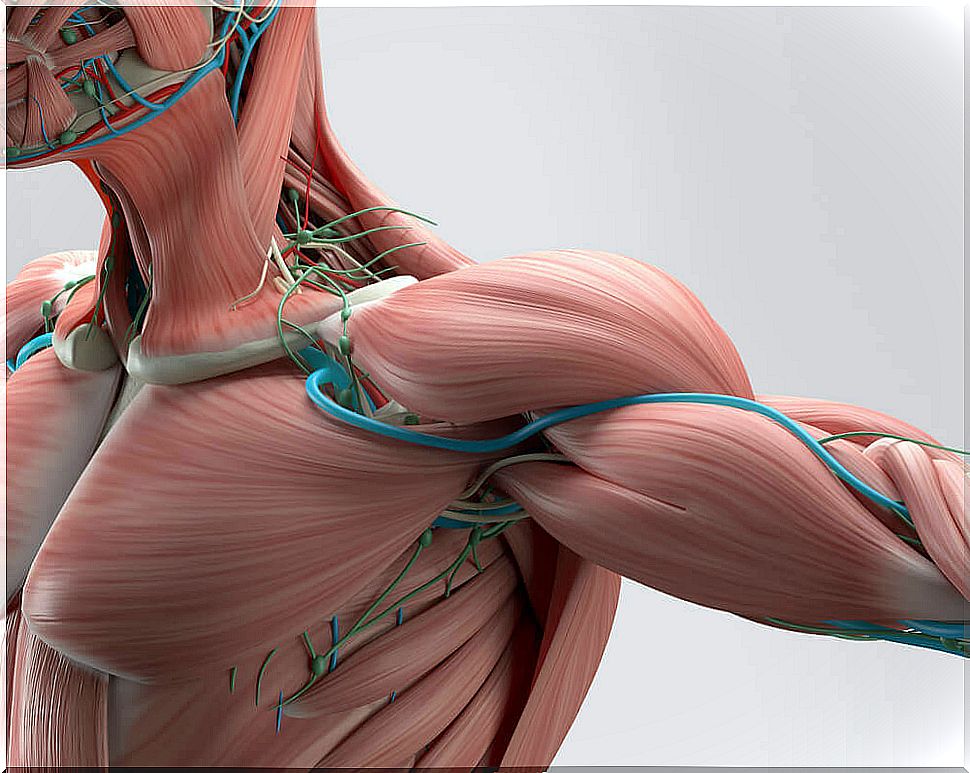What Happens To The Muscles When You Overexert Them?
Although exercise is very important for the health of our bodies, exercising too many muscles can be counterproductive and lead to problems if you do not get enough rest.

When we make exercise a regular part of our daily routine, it is easy to see great results in terms of physical, mental and emotional quality. However, if we abuse this activity to excess, it can harm our health. Here we tell you about what happens when you overexert your muscles.
The costs required and the types of exercises will always vary depending on the circumstances and abilities of each person, whether it is their age, lifestyle or physical condition. In this regard, the World Health Organization (WHO) recommends that adults (aged 18 and over) engage in at least 150 minutes of moderate-intensity aerobic physical activity per week. Alternatively, they can perform 75 minutes at high intensity each week to strengthen large muscle groups.
What happens when you overexert your muscles?

Muscles are soft, pliable tissue that provides movement, stability, and influences the structure of the bones and joints of the body. In addition, they come in different shapes and sizes, and represent almost half of our weight.
After overexerting certain muscles, our body experiences what is called delayed muscle pain (DOMS, for its acronym in English). It is generated by eccentric muscle contractions. This often occurs in people who do not have previous training or who increase their exercise significantly or are trying to apply an athletic routine.
Why this muscle pain?
Eccentric contractions occur when the muscle is narrowed while stretching. A clear example of this is what happens when a person is used to running, but trots up a hill. The next day you will have muscle pain as your body is used to exercising on a flat surface.
These pains are caused by micro-tears in the muscles. They appear when greater than usual resistance is put on the muscle when stretching or contracting too much during exercise. By exercising too much, muscles can cause injuries, such as ruptures and even sprains. For this reason, it is necessary to achieve harmony between the intensity of your exercises and to ensure that your workouts are safe for your physical integrity.
Recommendations to avoid muscle pain
1. Don’t ignore the pain
Reduce the intensity of your workouts. Only then will you be able to allow your muscles to heal and you will not be exposed to further injuries.
- If you don’t slow down, the ligaments and joints won’t rest as much as they need to. This way, you will increase the risk of cracks or tears.
2. Relieve pain and rest
Take a bath with hot water or enjoy a sauna which helps relieve muscle pain and relax you. In addition, the heat given off by the water eliminates toxins and releases endorphins.
- Also, don’t forget about the breaks: it is essential that the affected muscles can recover quickly.
3. Alternate hot and cold
Before starting physical activity, put a cold compress on the area where you experience muscle pain. Then, when you are finished with your program, put on a warm piece of clothing that will help you loosen up the area in question.
In addition to this, you can also use gels or creams with soothing ingredients which will be very helpful for your discomfort.
4. Have a warm-up routine
To try and avoid this muscle pain, schedule a warm-up session before you start exercising. Also, when you finish them, stretch to relax your muscles.
As you practice an exercise program, gradually increase the intensity. It is essential that you exercise frequently.
With this methodology, there will be few occasions when you suffer from muscle pain. It is very important to give the body the necessary time to adapt to greater demands.
People who exercise consistently are less likely to suffer from non-communicable diseases (NCDs), which account for 70% of deaths worldwide. Among these we find:
- Cancer
- Diabetes
- Osteoporosis
- Alzheimer’s
- Chronic renal failure
- Cardiovascular illnesses
- Heart attacks, among others.
5. Take care of yourself
If you want to have better physical, emotional and mental quality, always keep in mind that it is essential to take care of yourself and respect your body. All in the healthiest and safest way possible.
Don’t demand more from your body than it can provide. Anything too much hurts, so don’t overexert your muscles. Establish a comprehensive and varied training program. It should last at least 30 minutes a day and adapt to your physical condition.
This way, the intensity of your exercises will gradually increase. Thus, you will achieve the bodily goal that you have set for yourself. In addition, you will get an increase in the strength, tone, oxygenation, flexibility and volume of your muscles, as well as the resistance of your ligaments and tendons.
Exercise not only improves overall appearance, but also improves posture. This will give you more energy to develop and carry out each of your activities.









